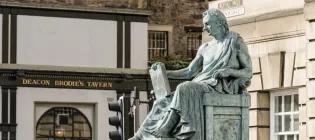The study of economics at universities in Scotland continues a distinguished record that dates to the eighteenth century.
The Scottish Enlightenment was a period of intellectual ferment in Scotland, running from approximately 1740 to 1800. The first major figure of the Scottish Enlightenment was Francis Hutcheson (1694-1746), who held the Chair of Philosophy at the University of Glasgow from 1729 to 1746. A moral philosopher with alternatives to the ideas of Thomas Hobbes, he founded one of the major branches of Scottish thinking and opposed Hobbes’ disciple David Hume (1711-1776). Hutcheson’s major contribution to world thought was the utilitarian and consequentialist principle that virtue is that which brought the greatest good to the most people.

David Hume and Adam Smith
David Hume himself (who studied at the University of Edinburgh from the age of twelve) is arguably the most important thinker in the Scottish Enlightenment. His moral philosophy eventually triumphed over Hutcheson’s, and his investigations into political economy inspired his friend Adam Smith (1723-1790) to more detailed work.
Adam Smith was a Scottish political economist and moral philosopher. His Inquiry into the Nature and Causes of the Wealth of Nations was one of the earliest attempts to study the historical development of industry and commerce in Europe. That work helped to create the modern academic discipline of economics and provided one of the best-known intellectual rationales for free trade and capitalism.
If Hume was primarily concerned with philosophy and worked less in economics, his ideas nevertheless led to important work in the latter field.
Following Hume’s impassioned defence of free trade, Adam Smith developed the concept and in 1776 published what is arguably the first work of modern economics: The Wealth of Nations. This famous study had an immediate impact on British economic policy, and it still informs 21st-century discussions on globalisation and tariffs.
Adam Smith is now widely renowned as the father of modern economics and was a Professor at the University of Glasgow 300 years after its foundation in 1451.
This article was published on

